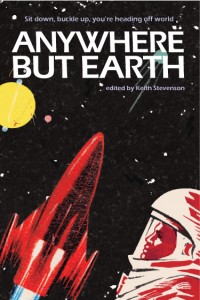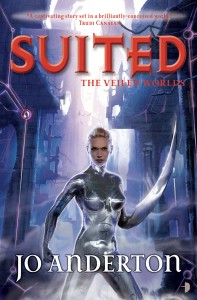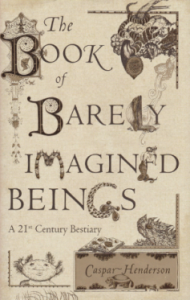 Anywhere but Earth
Anywhere but Earth
edited by Keith Stevenson, Coeur De Lion, 2011
This review was originally published on COSMOS Online.
If – or when – humans get to space on a regular basis, what will it hold for us? Adventure, cooperation with interesting aliens – or terror? Anywhere But Earth is a hefty enough anthology to consider the possibilities fairly thoroughly.
Contrary to many preconceptions about the genre of science fiction, there’s some beautiful writing in the collection – prime examples are the rhythmic beauty of Liz Argall’s “Maia Blue is Going Home” and Margo Lanagan’s disturbingly sensual “Yon Hornéd Moon”. But there are also some weaker stories present that if culled would have yielded a stronger anthology. Some had interesting premises but failed on execution, with the many that succeeded on both fronts emphasising the others’ shortcomings.
It’s telling that many of the stories have a military theme. In C.J. Paget’s “Pink Ice in the Jovian Rings”, women are space soldiers because of their smaller mass, like jockeys. The nightmare they’re caught in drives home the horror of war, regardless of setting. In William R.D. Wood’s “Deuteronomy”, robots searching for signs of humans, who’ve slaughtered each other to extinction, have a similar message. Taken together, the thesis could be that conflict is inevitable wherever humans go. Certainly, few stories have positive predictions for humanity, with the first story, Calie Voorhis’s “Murmer”, being a possible exception.
Other dystopian themes abound. Cloning in sci-fi can be an excellent lens through which to examine the nature of humanity, and Brendan Duffy’s “Space Girl Blues”, featuring cloned soldiers and a clever twist in the tail, makes full use of this without becoming earnest. Kim Westwood’s “By Any Other Name” tackles similar quandary, but in a grim setting where torture leaves the narrator’s father “a carapace of his former self” in a Big Brother-esque government’s desperate bid to rewrite history and claim humanity. Richard Harland’s “An Exhibition of the Plague” and Jason Nahrung’s “Messiah on the Rock” suggest that disease (and religion, in the latter’s case) will still have a powerful effect on our psyches in the far future. And Simon Petrie’s “Hatchway” is a nail-biting thriller about gang hazing and revenge in the harsh environment of Titan, one of Saturn’s satellites.
Amid all the darkness, humour can be a saving grace, and Anywhere But Earth features plenty. Angela Ambroz’s “Pyaar Kiya”, is a delightfully tragic tale of ageing being relative due to space travel. Penelope Love’s “SIBO” is wry and ramshackle despite the high stakes its characters face. “Poor Man’s Travel” by Patty Jansen features light-toned approach to moral and philosophical dilemmas.
To me, however, “SPACEBOOK” by Sean McMullen is a clear winner, as it explores opportunities lost for humanity with humour. It’s set in a virtual reality where you disappear if you use the word ‘lawyer’; its protagonist must discover a purpose for being there, but the journey is an irreverent social commentary with an undercurrent of seriousness. Surely this is the crux of sci-fi, as what is a book if not analogue VR?
 Suited
Suited

